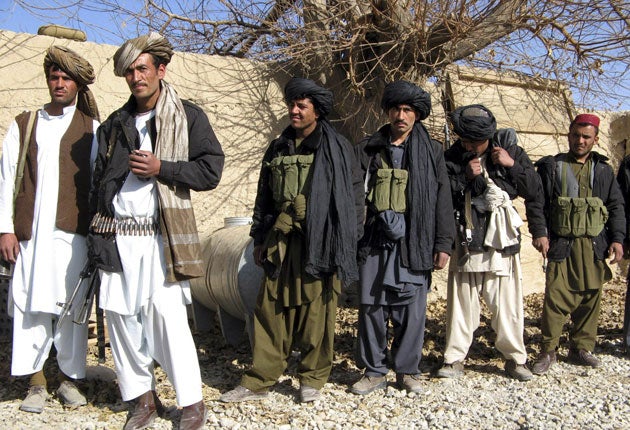Taliban 'killing their own' in bid to wrest back control in Sangin

Your support helps us to tell the story
From reproductive rights to climate change to Big Tech, The Independent is on the ground when the story is developing. Whether it's investigating the financials of Elon Musk's pro-Trump PAC or producing our latest documentary, 'The A Word', which shines a light on the American women fighting for reproductive rights, we know how important it is to parse out the facts from the messaging.
At such a critical moment in US history, we need reporters on the ground. Your donation allows us to keep sending journalists to speak to both sides of the story.
The Independent is trusted by Americans across the entire political spectrum. And unlike many other quality news outlets, we choose not to lock Americans out of our reporting and analysis with paywalls. We believe quality journalism should be available to everyone, paid for by those who can afford it.
Your support makes all the difference.Taliban gunmen have begun assassinating their own rank and file in a desperate bid to stop a remote mountain valley sliding from their grasp, as well as bringing in new commanders to oversee their fightback in Sangin, Afghanistan's most violent district, The Independent can reveal.
They are also attacking tribal elders trying to broker a peace deal between disillusioned members of the insurgency – resentful of Taliban commanders from other tribes and districts ordering them about – and government officials eager for peace.
Speaking by phone, a tribal elder in the upper Sangin valley said Taliban gunmen ambushed an elder from the Alokozai tribe called Badar Agha as he left home for morning prayers earlier this month. Aware an attempt on his life was likely, the elder shot back with his Kalashnikov, apparently wounding an assailant before being taken to hospital for medical treatment.
Two local Taliban commanders known to be sympathetic to a détente were less fortunate. Riza Gul and Pahlawan disappeared soon after the attack on Badar Agha. "Everyone says they've been killed," the elder said.
Losing control of the upper Sangin valley would be a disaster for the Taliban proper. Not only do they get a lucrative cut of the district's drugs revenues, but the area is totemic for the number of Nato casualties there – 133 dead, and counting. More important than either of those factors is its location. Sangin controls access to the Kajaki dam – described by one Afghan politician as a "national treasury".
To try to quell resistance in Sangin, the Taliban proper have appointed a new shadow governor to the district as well as targeting the peace-makers. Mullah Wali Mohammad was instated after the attacks on Badar Agha, Riza Gul and Pahlawan and is said to bring crucial skills to the table.
"He is sociable, well-informed and not too strict," one acquaintance said. "He interacts with people very well."
Besides bringing a silky touch to the fractious politics of the upper Sangin valley, Mohammad has a trait that - in the wake of so much betrayal – the Taliban high command will prize. A nephew of Mullah Rauf Akhund, a founding member of the Taliban, he is a staunch loyalist who is unlikely to switch sides.
The Alokozai have a history of defiance. In 2007, they rose up against Taliban interlopers who had arrived in their valley, only for the Taliban to crush the revolt. To make a point, they chained the leader of the uprising to a truck and dragged him to another province. Nato and the Afghan government forces were too stretched to ride to the rescue - a fact that left many mistrustful of the alliance.
Some villagers suspected President Karzai ignored pleas for help because of business links between his half-brother Ahmed Wali Karzai and Haji Lal Jan, one of four major drugs barons from Sangin. A successful uprising would have hurt Mr Jan's business interests, and by extension, Ahmed Wali Karzai's, whom a US diplomatic cable in 2009 characterised as "corrupt and a narcotics trafficker". Whether there's a basis to the allegation, in a country where perception is reality, the rumour helped dampen chances of a second uprising for years. So too did the reluctance of tribal elders who fled Taliban reprisals in 2007 and have since lived in comfort in Helmand's provincial capital. Slowly their authority dwindled.
Enter Badar Agha and co., whose emergence as de facto leaders of the tribe has triggered this second rebellion. Nato and the Afghan government would do well to heed warnings of elders interviewed by The Independent, who showed little interest in exchanging one set of overlords for another.
Several sources said the arrival of US marines, who took responsibility for Sangin from the British last autumn and have adopted more aggressive tactics, had compounded their woes.
"The situation has got worse," one source said. "Yes, the Taliban has been seriously weakened but at the same time a lot of civilians have lost their family members and homes in Sangin." He said that many of the villagers were afraid to report the full scale of their losses "since they don't trust the government and marines, who always promise but never deliver."
Join our commenting forum
Join thought-provoking conversations, follow other Independent readers and see their replies
Comments